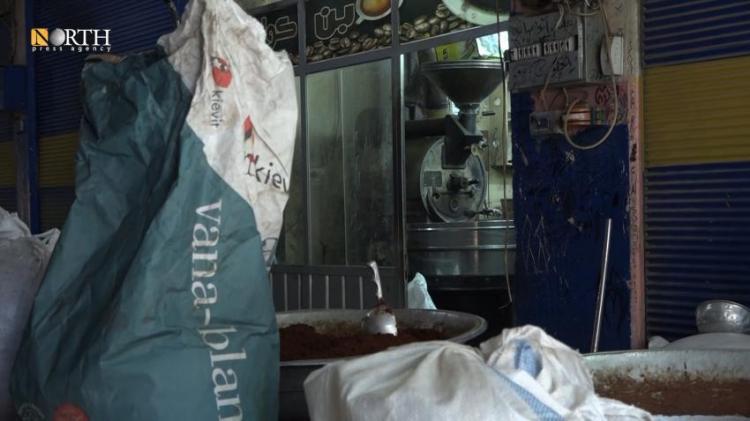Qamishli – North-Press Agency
Charbel Henno
Passers-by on the al-Jamea al-Kabir Street in downtown Qamishli are used to smelling coffee in the early hours of the morning, coming from a popular shop owned by Metin Koza and his son Sabri.
Koza, who belongs to the Syriac Christian minority, started making coffee in 1991 with a small capital, less than 100 kilograms of coffee, and only one grinder. He was accompanied by his son Sabri, who was only 14 years old.
The Jazira region in northeastern Syria is known for various professions and industries, some of which started decades ago with rudimentary equipment and are passed down from generation to generation.
In his small roasting shop whose walls are filled with names, phrases, and dates belonging to people who worked in and left behind interesting memories, Metin Koza and his son Sabri were able to make a recipe for good coffee that helped them to win a large number of customers in a short time.
"Those names worked here and left their mark on the roaster," Sabri said, touching the old walls. "We will not forget every name that has a memory for him here. The shop is small in size, but it has received many workers who remember it wherever they are."
He told North-Press that the story of their success started with very simple equipment, but they were able to make a "magic recipe" whose secret is known only to them.
The younger Koza relies on coffee roasting equipment in his shop in Qamishli instead of buying ready roasted coffee from the Syrian city of Aleppo, which helped him to hone his skill.
Now Sabri, who is over 40 years old, says: "We get green coffee, and we work to roast it here, grind it, and sell it. Our recipe has become desirable and we have gained in a large number of customers in a short time."
The elder Koza continues supervising the work to ensure maintenance and increase the efficiency of the machines in the shop, as he is proficient in everything related to this profession despite reaching the age of 70.
The son does not hide his pride for his father and his efforts. "My father is proficient in everything related to this work despite his old age, so we do not need any of the shops in the industrial zone to maintain the breakdowns."
The war in Syria has greatly affected the various crafts that the inhabitants of the region used to master, as many craftsmen and professionals migrated abroad. But Koza's family did not consider settling outside Syria.
As for Matin Koza and his son, the impact of war was different with the beginning of the crisis in Syria due to the interruption of trade between northeastern Syria and the Syrian interior, which prompted them to use other trade methods to secure the necessary raw materials from Turkey, which negatively affected production costs.
Now Koza owns four coffee grinders and a large roaster in his shop after expanding the workspace and employing more people due to the increased demand for the product.
Kuljan appears to be a small store, but after three decades of effort, work, and perfection, its products are sold to all areas of northeastern Syria, from Derik to the city of Kobani.

